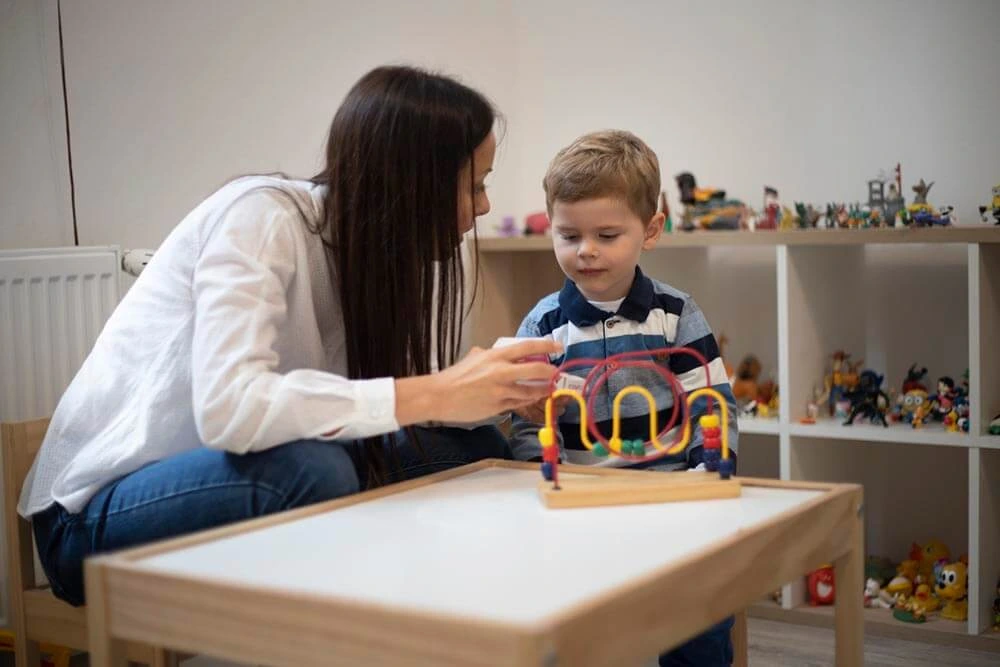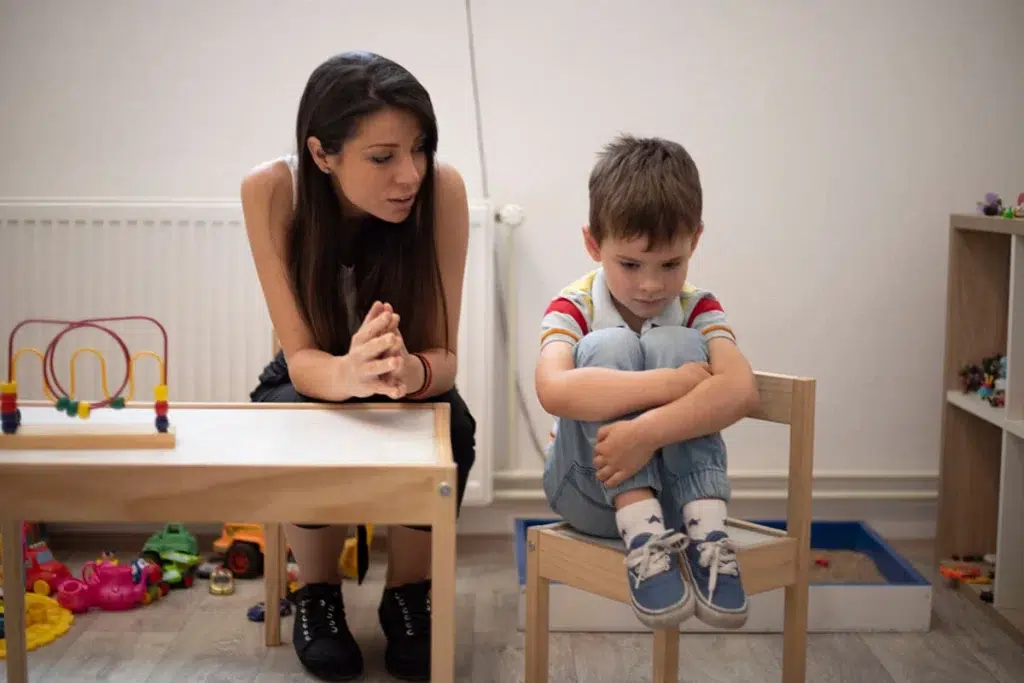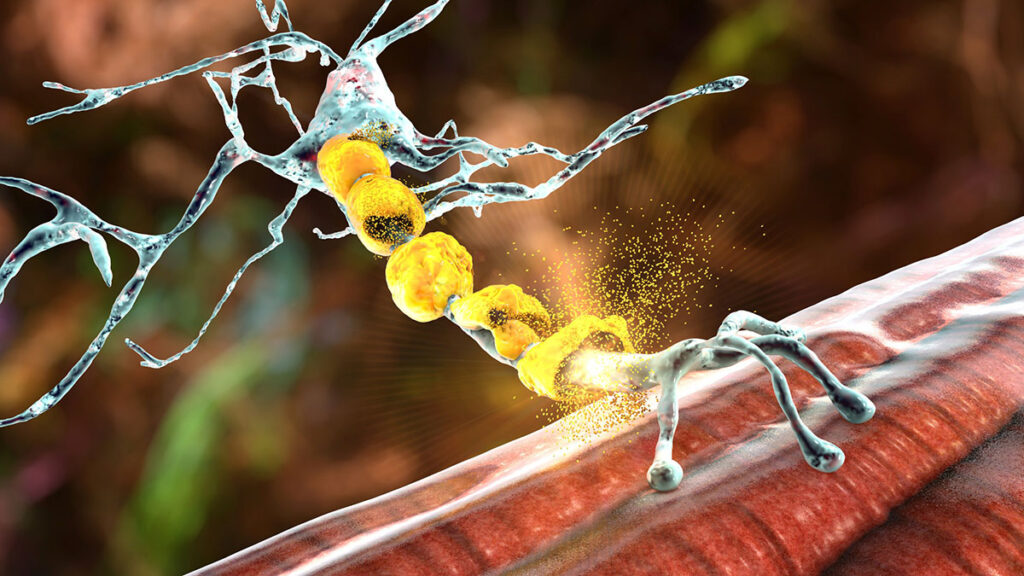Early Signs and Symptoms
Some children may show the earliest symptoms of Asperger’s syndrome as early as the first few years of their life, but in most cases, they get diagnosed in their school-age years.
Many children, adolescents, and young adults with Asperger syndrome are considered high-functioning due to their advanced vocabulary and grammar skills. However, they struggle with poor communication skills and difficulty employing language in social interaction.
Children with Asperger’s syndrome tend to exhibit different speech patterns and facial expressions. They have trouble understanding neurotypical people’s social cues, such as body language, eye contact, or sarcasm.
Additionally, their hypersensitivity to sensory stimuli (such as lights, sounds, smells, and textures) can make them even more vulnerable in social situations. Another unique trait of children on the Autism spectrum is their tendency to develop obsessive interests and stick to strict routines.
Signs of Asperger's Syndrome in Young Children
Every child with Asperger’s syndrome may develop different symptoms.
A school-age child with Asperger’s syndrome may show one or more of the following signs:
- Unusual manners of speech (excessively quiet or loud, high-pitched, flat, or robotic)
- Difficulties with coordination and balance, including struggles with handwriting
- Impaired social skills and minimal interaction with peers
- Difficulty controlling emotions, resulting in verbal and physical outbursts of aggression
- Inability to grasp nonverbal communication (facial expressions, gestures, and body language)
- Inability to understand and empathise with other people's emotions or perspectives
- Exceptional memory skills, especially when it comes to topics of interest
- Attachment to rigid routines and distress at any small changes
- Intense fixation on specific topics
- Under-sensitivity or oversensitivity to sensory information (lights, sounds, smells, and textures)
Repetitive Behaviours and Restricted Interests in Children with Asperger's Syndrome
Just like all differences on the Autism spectrum, one of the main characteristics of Asperger’s syndrome is the presence of repetitive behaviours and restricted interests.
A child with Asperger syndrome may echo certain words, phrases, or sounds they have heard from their parents or teachers. In addition to that, most children with Asperger’s syndrome engage in repetitive movements, such as:
- Hand-flapping
- Twirling
- Pacing
- Rocking back and forth
- Flipping objects
- Lining up toys

Children and adolescents with Asperger syndrome usually feel comfortable in a strict routine framework. Even slight changes to their schedule can cause them distress, leading to possible outbursts.
Furthermore, individuals with this difference may grow enthusiastic about specific areas of interest and easily memorise a lot of information about them. Children with Asperger syndrome often fixate on their favourite topics in conversations with their peers or adults.
Sensory Issues in Children with Asperger's Syndrome
Dealing with sensitivity to sensory experiences is a part of living with Asperger’s syndrome. Some forms of input (such as loud noises, flashing lights, and extreme temperatures) cause sensory overload in children with Autism Spectrum Disorder, leading to intense outbursts and behaviours of distress.
Certain materials and textures (such as water, chalk, or modelling clay) can also act as potential sensory triggers.
While neurotypical individuals take these sensory experiences for granted, they can cause significant discomfort for a child with an Autism Spectrum Disorder. Therefore, sensory issues in children with Asperger’s syndrome may be initially difficult for parents and teachers to figure out.
The child’s behaviour may pose a challenge to adults around them, who might misinterpret it as deliberate misbehaviour. This is not the case, and the child should be treated with compassion and understanding.
Signs of Asperger's Syndrome in Teens
In most cases, Autism Spectrum Disorder is detected in the person’s early childhood or school-age years. However, as a high-functioning form of ASD, Asperger’s syndrome causes milder symptoms that can be overlooked. Many individuals start showing signs in their adolescence.
Every person experiences Asperger’s syndrome uniquely, but common indications include the following:
- Difficulty making eye contact, understanding body language, and grasping other social cues like humour or sarcasm
- Strong need for a fixed routine and structure
- Struggles with planning and organisation and has difficulty following instructions and staying on task
- Behavioural issues, including social isolation and outbursts of aggression
- Struggling to keep conversations going and engage in turn-taking
- Difficulty regulating one's emotions
- Lack of understanding and empathy for other people's thoughts and feelings
- Unusually clumsy, uncoordinated movements
- Obsessive fixation on specific areas of interest
- Sensitivity to sensory input (lights, sounds, tastes, smells, and textures)
How Important Is an Early Assessment?
Autism Spectrum Disorders, including Asperger’s syndrome, are lifelong developmental differences that affect various areas of a person’s life. Early assessment and intervention allow children, their caregivers, and educators to manage symptoms effectively.
Individuals diagnosed with Asperger’s syndrome in their early childhood have a higher chance of bettering their social skills, gaining independence, and reaching their full potential.
An early assessment of Asperger’s syndrome gives the child access to timely treatment and enables the family to outline their next steps. This way, parents can consider adequate plans and programs for their child’s accommodation. The earlier your child receives a diagnosis and treatment, the more space you have to plan for the future.
In their early development stages, it’s easier for children to overcome social challenges and develop new skills. Access to early and proper treatment allows children with Asperger’s syndrome to implement new ways of communicating their needs.
How To Explain the Diagnosis to Your Child
Some parents choose to disclose the Asperger’s diagnosis immediately and give their child an early sense of understanding. Others may decide to wait a few years until the child can understand the meaning of the diagnosis.
You should take a positive approach when explaining Asperger’s syndrome to your child. Introduce the youngster to the characteristics of this difference while highlighting unique strengths (e.g. excellent memory). Once you do that, be prepared to answer possible questions, address your child’s concerns, and encourage them to express their feelings about the diagnosis.
Books, websites, and expert guidelines on Autism Spectrum Disorders can help you through this process.
Difficulties if Left Untreated
Diagnosis is just the first step on the developmental journey of individuals with Autism Spectrum Disorders.
It opens the door for people with Asperger’s syndrome to access various forms of therapy that benefit their physical and mental health. While doctors are responsible for medical interventions, caregivers and teachers are here to create an accommodating environment for children diagnosed with Asperger’s syndrome and guide them through everyday challenges.
Although Asperger’s syndrome is considered a high-functioning form of Autism, individuals without treatment can face difficulties in the following areas:
- Following rules and instructions at home or in the classroom
- Understanding social cues (such as body language, sarcastic remarks, and sarcasm)
- Inability to grasp turn-taking and maintaining optimal distance in conversation, which can be perceived as rudeness or disrespect
- Self-regulation and sticking to a particular task for a longer time
- Maintaining focus over a full school day
- Partaking in sports activities and nurturing a healthy lifestyle
- Confidence and self-esteem
- Sleep disruptions and subsequent fatigue
- Tendency to struggle with mental health issues, especially depression and anxiety
Asperger's Syndrome and Learning Difficulties
Asperger’s syndrome is not a learning disability.
Most children and young people with this Asperger’s syndrome can read, decode language, and absorb information by rote learning. However, children with Asperger’s syndrome can struggle with more complex forms of learning that involve understanding ideas, concepts, and patterns.
Like other children on the Autism Spectrum, youngsters with Asperger’s syndrome often struggle to organise their thinking, plan and carry out actions, or engage in problem-solving. For instance, a child with this difference may find it hard to follow the steps of completing a project or break down a task into smaller chunks.
People with Asperger’s syndrome and ASD may have learning difficulties, such as dyslexia. However, not all people with Asperger’s syndrome and ASD have learning difficulties.
Support For Children With Asperger's Syndrome
Depending on the child’s specific needs, there are numerous options for expert treatment for children with Asperger’s syndrome. Children with this difference can benefit from the following:
- Speech and language therapy
- Occupational therapy
- Behavioural support
- Psychotherapy
- Physiotherapy
- Nutritional support

Constant expert support from a home care team in early childhood allows individuals to develop cognitive and social skills, control their behaviour, and reach their full potential.
Leaf Complex Care Supports Children With Asperger Syndrome
At Leaf Complex Care, providing unparalleled support to children on the Autism Spectrum is our mission. Our trained support workers are dedicated to the comprehensive accommodation and integration of every child with Asperger’s syndrome.
We aim to channel these children’s unique strengths in a positive framework and help them reach their full potential. Our person-centred care plans prioritise the child’s independence, self-esteem, and boundaries.
If your child has been diagnosed with Asperger’s and you are searching for a home care provider, Leaf Complex Care is the right place for you. We deliver CQC-regulated care in Bristol, Exeter, Slough, Somerset and the Midlands.
Contact us, and we will outline a tailored care plan that caters to your child’s needs.








